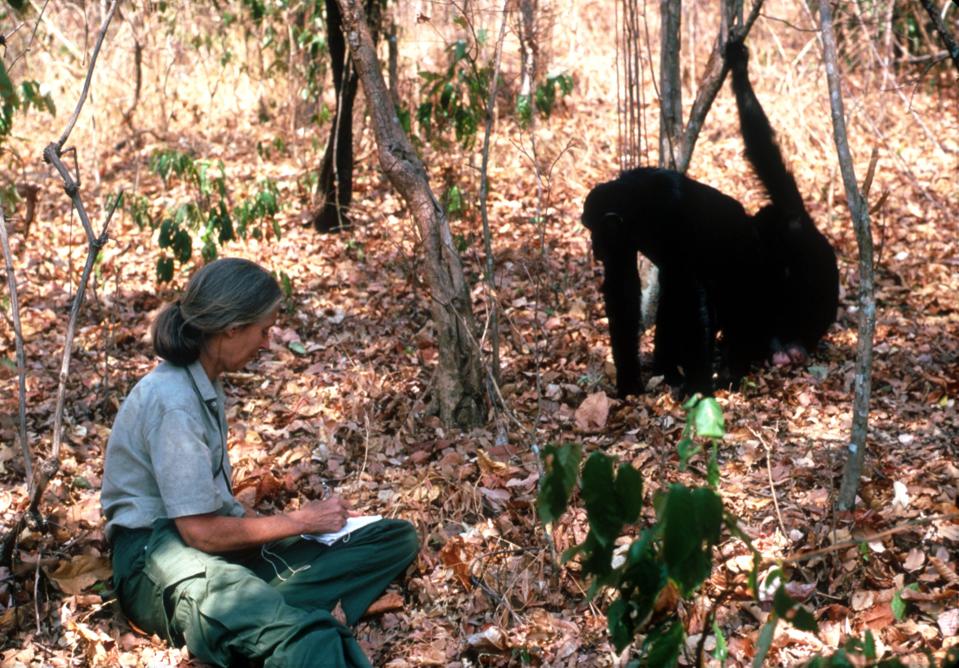In 1960, a 26-year-old Jane Goodall arrived in Tanzania with binoculars, a notebook, and an unyielding curiosity. She began to watch and study chimpanzees in Gombe Stream National Park, where she was the first to witness one of them using tools. This groundbreaking observation marked the beginning of her scientific work, later becoming her legacy.
Fast-forward to 2025, she is Dr. Jane Goodall, DBE, the legendary founder of The Jane Goodall Institute and UN Messenger of Peace. Even at 91, she remained tireless, traveling the world 300 days a year to discuss conservation, hope, and resilience until her final days in California. Dr. Jane Goodall passed away on October 1, 2025, in her sleep.
Every Action Leaves An Impact, So Choose Wisely
In one of her last public appearance at the 2025 Forbes Sustainability Leaders Summit in New York City on September 22, 2025, she talked to Forbes senior editor Maggie McGrath.
“We depend on a healthy ecosystem that we gradually destroy because of unsustainable demands on those natural resources. People want too much, more than they need. We are the most intellectual creatures to walk the planet, but we’re not intelligent. If you are intelligent, you do not destroy your only home,” she said.
She believed today’s world lacks courage. People must find the courage to do the right thing and the health of the planet should be at the center of every political and economic conversations. She was holding hope that human intellect could develop technologies to help us live in greater harmony with the natural world.
She recalled her core message while talking about Roots & Shoots, a global youth program she founded in 1991 to empower young people to identify problems in their communities related to people, animals and the environment. In the interview, she repeated, “Every day you live, you make an impact on the planet. But you can choose what sort of impact you make. So choose wisely.”
She recalled the hopeful shift in recent years that people began asking questions: How was it made? Did it harm the environment? Was it cruel to animals in factory farms? Was it cheap because of unfair wages? So, she urged everyone to choose more environmentally sustainable and ethically produced goods. “It may cost more. But if it cost a bit more, you will value it more,” she said.
What Is Tourism For Good? According To Dr. Jane Goodall
The above extends far beyond what we buy, to how and where we travel. She also believed that tourism plays a critical role in the survival of many species, including chimpanzees and gorillas.
The Jane Goodall Institute, she founded in 1977, has a long-standing cooperation with G Adventures, an adventure travel company specializing in small-group tours that emphasize authentic, immersive experiences in over 100 countries across all seven continents.
The Jane Goodall Collection is a series of wildlife-focused tours that supports conservation, animal welfare and community development,
Her message is not to end tourism, but to manage it responsibly. She believed encounters with wild primates can have a profound and lasting impact on people.
“I know how people have been utterly changed by looking into the eyes of a wild chimpanzee. They are never the same again,” she recalled.
The Jane Goodall Institute supports “conservation tourism” that is not about minimizing risks, but about actively creating conservation gains, such as benefiting biodiversity and providing sustainable economic opportunities for the local communities.
The Institute’s 2024 Wildlife Tourism Policy frames tourism as a tool that must be designed, managed and monitored to yield net gains for biodiversity, animals, and people.
It mandates strict adherence to expert-developed best practices (especially for primates and great apes), with rules on group size, proximity and disease prevention.
The policy also addresses sanctuaries and calls for prioritizing the welfare of their animals and avoiding exploitative entertainment.
However, not all forms of wildlife tourism are ethical. The policy explicitly rejects trophy hunting, calling it unethical and ecologically damaging.
A Shared Legacy Of Protecting Nature
Alongside influential figures like Sir David Attenborough and the late Dian Fossey, she transformed how the world understands and values wildlife.
Her vision was rooted in respect for animals and in the belief that encounters with nature can inspire lasting change.
As the world reflects on her passing, her message endures: each of us has the power to shape a more ethical and sustainable future, only if we choose wisely.

